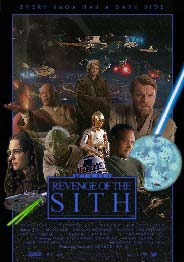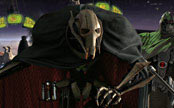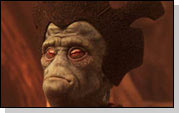
| Bad Astronomy |
|
|
|
BA Blog
|
|
Q & BA
|
|
Bulletin Board
|
| Media |
|
|
|
Bitesize Astronomy
|
|
Bad Astro Store
|
|
Mad Science
|
|
Fun Stuff
|
| Site Info |
|
|
|
Links
|
| RELATED SITES |
| - Universe Today |
| - APOD |
| - The Nine Planets |
| - Mystery Investigators |
| - Slacker Astronomy |
| - Skepticality |
Buy My Stuff

Keep Bad Astronomy close to your heart, and help make me
filthy rich. Hey, it's either this or one of those really
irritating PayPal donation buttons here.
Review: Star Wars: Revenge of the Sith

Note to all Star Wars fans:
I like the "Star Wars" series. I do. But I like
it, I don't love it. I am not a huge fanboy, and there
are going to be items in this review that will almost certainly
rankle the diehard fans out there. So I'm being up front. I don't
remember the name of every character, every droid, every planet
they visit. But this makes me more along the lines of the
vast majority of people who will see the movie, and my review
will reflect that. Well, that, and the fact that I am
a huge science geek. So there.
Introduction
This is a bit weird, I'll admit. I was 13 when "Star Wars" came out, and to me that movie will always be the Star Wars. I liked "Empire Strikes Back" but the third movie grated on me a bit. Then the long wait, to be finally broken with "Phantom Menace" which, let's be honest, sucked. "Clones" was better, in that it didn't suck as much as "Menace", but that's damned with faint praise indeed.So having said all that, I'm here to say that for the most part, "Revenge of the Sith" is a good flick! The story is pretty well done, and does manage to tie everything together (in my opinion, at least; not being the huge fanboy of the series, I probably missed out on some nitpicking details that are inconsistent. But, to be frank, I don't care). I wasn't sure how George Lucas would handle an audience who really does know exactly how everything must end. But it was handled rather well.
There wasn't a whole lot of astronomy or even science in the movie to review. But there was some, and being a geek I have to point it out. Don't assume I'm just being nitpicky! Rather, assume that I point it out because I love to talk about science, and the movie is a good excuse to do that. And if I keep telling myself that, I'll forget that I really am a nitpicky curmudgeon who delights in pointing out other people's errors.
The Review
Bad:The movie opens with space battle (duh, they all do). Obi Wan and Anakin are zooming around in their one-man ships, going in to rescue the Chancellor. They are attacked by several ships, one of which releases "buzz droids" which attach themselves to Obi Wan's ship, and start to dismantle it. Anakin comes in to save his Master once again, and he rams the droids. They fall off Obi Wan's ship, flying back.
Good:
Okay, there are a few things going on here that aren't right. First,
I hesitate to mention it because nearly every science fiction show in
the history of the Universe screws this up, but there's no sound in space.
Sound needs a medium through which to travel, like air, or water... but
space is a vacuum.
I am willing to overlook this when ships scream past the point of view of the audience, because everyone does it, and we as humans stuck on this planet are used to hearing a noise when things rush past us. But to actually bring it to our attention by using a machine called a "buzz droid" and then to actually hear them buzzing when they are in the vacuum of space is simply too much. It's rubbing my nose in it. Lucas did this same thing in "Attack of the Clones" with his sonic mines, and I wasn't happy then either.
I'm sure the fan contingent will email me saying that sound can carry through metal, and so we could in fact hear the droids, but I ain't buying it. We hear them communicating with each other too! Also, sound doesn't carry that well through the hull of a ship. You just wouldn't hear them that clearly.
After Anakin rams the droids, they fall away, behind Obi Wan's ship. However, they are in space, so the droids should float away after being rammed. The only way for them to fall behind would be for Obi Wan to accelerate, so he would be moving faster than the dead droids, and they would appear to fall behind him. But there's no indication he's doing so (and in fact is wasting time talking to Anakin when he should be concentrating on getting to his destination, but the ways of the Jedi are mysterious).
Note added May 26, 2005: several people have emailed me saying the thrusters were firing during this sequence, so my objection is not valid. That may be true... but then again, the ships move in all different directions, but the thrusters are always firing straight back! It's not clear how the ships maneuver. Also, since they are in space, they don't need to fire thrusters all the time; they don't slow down if they don't use the rockets: they'll coast at a constant speed. So the scene is still wrong, nyah nyah nyah.
Bad:
After the typical fighting mayhem, the ship carrying Obi Wan, Anakin, and
the Chancellor loses gravity. It starts to tip down toward the planet below.
The floor slopes, and they have to hold on to stop from sliding down the floor.
Good:
The ship was in orbit, so there is no up or down! I have to assume they
have some sort of artificial gravity, and they lose it. But then
everyone should float! Instead, it's depicted like a room that's
tilting. Even R2 (who has thrusters in his feet, as I recall) starts to slide
along the floor.
Even though the ship is accelerating toward the planet, this is simply due to the gravity of the planet, and all things on the ship experience the same acceleration, so they should all float around. In fact, that's why astronauts float when they are in orbit: it's not due to the lack of gravity! Where the Shuttle orbits, the gravity they feel from the Earth is about 90% of what we feel on the ground. The reason astronauts float is because they are essentially "falling" around the Earth, and everything is falling at the same rate. There is no net force on anything, so it feels like there's no gravity. If you hold a pen in front of you and let go, it falls at the same pace you do, so it looks like it's floating in front of you. To someone outside the Shuttle and not moving, it looks like you and the pen (and the Shuttle) are all moving past them at the same rate.
This is also what would happen on the ship in the movie, so they should have been floating around, not sliding.
 Oh, another thing: when
General Grievous jumps outside the ship,
we definitely see his cape waving in the wind. What wind? He's in
space! He was already outside the ship, and had moved
well away from where he broke the glass to escape outside. There
should have been no air where he was. Also, this is not like
the flag waving gently in the Apollo footage:
in there, you can see the flag
is moving due to the astronauts moving the flagpole around. In
Grievous's case, it was whipping around, like in a stiff wind.
Considering it was all
computer animated, this had to be added on purpose. They should
have had his cape floating around him.
Oh, another thing: when
General Grievous jumps outside the ship,
we definitely see his cape waving in the wind. What wind? He's in
space! He was already outside the ship, and had moved
well away from where he broke the glass to escape outside. There
should have been no air where he was. Also, this is not like
the flag waving gently in the Apollo footage:
in there, you can see the flag
is moving due to the astronauts moving the flagpole around. In
Grievous's case, it was whipping around, like in a stiff wind.
Considering it was all
computer animated, this had to be added on purpose. They should
have had his cape floating around him.
And why does everyone wear capes anyway? They get in the way when you're fighting. Cripes, I don't even like wearing a jacket when I get into death battles with enemy drones. It slows me down.
Note added May 26, 2005: several people have emailed me saying the ships were actually in the upper atmosphere during the battle. I don't recall them actually saying that in the movie, but let's say they were. If so, why would Obi Wan announce they were now in the atmosphere? Silly. Also, in the upper atmosphere, the air would be too thin to make Grievous's cape flap. Sorry, folks, these scenes are internally inconsistent no matter how you slice them!
Bad:
As the ship falls toward the planet, it enters the atmosphere.
It heats up, with flames trailing behind it. Parts start to fly off.
After at least a half minute of this, we cut to the control room, and
Obi Wan says "We're in the atmosphere."
Good:
No duh, Sherlock. What clued you in to that? :-) Actually,
I thought that line was funny, as they had been in the atmosphere
and commenting about losing pieces of the ship for quite some
time before that.
Also, a point I like to make, even though it's not mentioned in the movie: re-entering ships don't heat up due to friction. It's actually due to the object compressing the air ahead of it. Compressing a gas heats it up (think about how warm a bike pump can get when you use it), and a ship entering the atmosphere is moving really quickly. It compresses the gas a lot. That is what actually heats up the Shuttle, and meteors, and Republic warships.
Oh, another thing: as they are about to land (well, it was more like a controlled crash landing), ships fly along spraying water on them to put out the fires. Besides being pretty silly, the streams of water are shown dropping straight down onto the warship. Um, they are about to crash land at several hundred kilometers per hour, so I would think the wind would be pretty fierce and blow the water streams backwards. This is a nitpick, of course, but it really made the scene look fake to me. I have noticed that audiences may not be able to say exactly what makes a scene look wrong, but they can "sense" it, if you will. It's stuff like that that does it.
Another thing like that is not getting motion correct when showing characters jumping. When a real person jumps, they go up, slow down, stop, accelerate down, and land. In movies, when superhuman characters jump, they never slow down on the way up or speed up on the way back down! It looks fake, and that happened several times in this movie with Yoda, Anakin, Obi Wan, and other Jedi and Sith leaping around.
Bad:
There are big land battles in this movie (and all the others, too).
Attack ships come, invaders storm out, shots are fired, mayhem
ensues.
Good:
This really bugs me. Infantry? Really? Is that the best this
advanced civilization can do?
I have a better plan. Take all those honking huge ships, go behind a mile-wide asteroid, and push it so it drops onto the planet. Massing over a billion tons and impacting at 10 kilometers per second or so, I guarantee it'll end the battle quickly. In fact, the explosive yield of such an impact is about 65,000 megatons. That's way, way more than every nuclear weapon on Earth. Bang! End of battle.
Oh, you want the planet to be usable when you're done? Picky, picky. But OK, then drop several hundred smaller asteroids. Same thing, but you can maybe aim them better, and target smaller battles. Once the smoke clears the planet will be in somewhat better shape.
And if you screw up? Well, there are always more planets.
Bad:
In the climactic scene of Obi Wan and Darth Vader battling it out with
light sabers on the volcanic moon, we see fire fountains in the background.
They also fight while floating along on bits of debris in a
giant river of lava.
Good:
Jedi are strong, sure, but I think even they might have a hard time
keeping from bursting into flame under such circumstances. We see a
lot of lava, and it's hot. Lava radiates that heat,
and is substantially hotter than an oven. In fact, lava is generally
at a temperature of about 1200 degrees Celsius.
With that stuff filling the sky as it was, the Jedi would have
done more than sweat; they would have vaporized.
Note added May 26, 2005: In my original version of the above section, I said lava was at 4000 degrees. Several people emailed me saying it isn't that hot, and they were right. Serves me right for not googling it.
Second note added June 21, 2005: I have received many, many emails pointing out that there are shields around the factory, which would protect the Jedi (you can see the shields glowing blue in the movie). However, I don't see how shields would protect them if they are floating on the river itself. While it's still possible that The Force protected them, the shields certainly wouldn't.
 That's why scientists who study volcanoes (or firefighters, for that
matter) wear special suits. Lava is hot, and even a little
bit nearby can kill a person from the heat. Having the two Jedi (well,
one Jedi and one Sith) floating in a lava river was just plain
silliness.
That's why scientists who study volcanoes (or firefighters, for that
matter) wear special suits. Lava is hot, and even a little
bit nearby can kill a person from the heat. Having the two Jedi (well,
one Jedi and one Sith) floating in a lava river was just plain
silliness.
I will grant that maybe, maybe, their powers could protect them. The supporting evidence of that is that Anakin didn't burst into flame until Obi Wan injured him very badly, cutting off his legs (and I think an arm, it was hard to tell). Anakin was screaming, and clearly couldn't concentrate (the wuss). So maybe he could no longer protect himself with the Force, and that's why he ignited at that point. But even then, he should have been nothing more than a wisp of vapor, and not just a guy who who looked like a sausage left on the grill a minute too long.
Wow, that's really it for the science. Not much, but I covered a lot of the other badnesses in my reviews for The Phantom Menace and Attack of the Clones. Still, I did have some things that bugged me about the movie that aren't science related. Here are some:
- Why didn't Obi Wan sense Anakin coming back in the elevator when
they were trying to get to the Chancellor in the beginning of the movie?
Instead, he was surprised, and actually drew his light saber! They
make it clear through all six movies that people who are strong with the
force can sense each other, and Anakin was still too untrained to be able
to hide his presence.
- Once Grievous "kidnaps" Palpatine, why didn't he just
break orbit and get away? Of course, it was all a plot to get the Jedi
there, but then Obi Wan should have been wondering why the ship wasn't
trying to get away. He said he sensed a trap, but still.
-
Why do Storm Troopers wear armor? A BB gun would penetrate the stuff
they wear. Sheesh.
-
And speaking of bad tactics, it seems like major characters in the
Star Wars saga would learn to avoid high platforms, especially
over molten rock or in the rain.
This is simply asking for a light saber duel, and someone having to
cling to dear life from the edge of the platform.
- Obi Wan leaves Anakin to die by the river of lava? Has he
never seen a bad science fiction movie in his life, or
read
The Top 100 Things I'd Do If I Ever Became An Evil Overlord?
Yeah, yeah, Anakin is like his brother, and he cannot kill him, and boo
hoo hoo. Obi Wan knows better. He should've stuck him right there
with his light saber. At the very least it would put Anakin out of his misery.
-
Geez, does Viceroy Nute Gunray sound exactly
like Mojo Jojo
or what? Curses!


Mojo Jojo and Viceroy Nute Gunray: Separated at birth? -
A note to the lady who brought her five-year-old daughter to the movie:
did you not see the PG-13 rating? All I could think of when
Anakin was lying on the shore of the lava river, literally on fire, was
what that little girl will be dreaming about tonight. Sheesh.
Everyone who reads this: the movie is not for kids under about
the age of 10, at best. That rating is deserved.
-
I read on the web that some people are wondering if this movie was a
thinly disguised political attack on the current Bush administration.
I must admit, there were several comments made in the movie that
sure seemed like that was part of the point. The Chancellor
consolidating his power was one, controlling the Senate
was another, and trying to control the judiciary was a third.
Padme even says something like, "So much for a safe and secure
society", which resonates with many things the current
administration has said. I don't know if Lucas put
those in there on purpose or not, but I'm sure there will be
rampant speculation about it on the web.
-
I'll admit, parts of this movie were really excellent, but let's
be honest, too: the acting was not very good. The love scenes
were so forced they were painful. I sometimes wonder if
Lucas was trying to emulate the acting style of the old
1940s serials; the movies are obviously based on those old flicks.
But it really seems like he just can't get good performances out
of his actors. What does it tell you when the best acting
job is done by a computer-generated character who was first
played by a muppet who sounds like Fozzy Bear? Wow.
Having said that, the battle scenes were really enjoyable, if completely implausible. There was a lot going on, and it was fun to watch. In fact, I may very well go out and rent the original (I almost wrote "only") Star Wars, so I can watch it again with this movie in mind.
It's been an interesting ride these past 28 years.
Links
Of course, there are a zillion pages about Star Wars on the web.
- The official Star Wars site is
www.starwars.com. There is a
history of all the movies, lists of planets, aliens, ships
and everything else. If you are a fan, this is the place for you.
- TheForce.net is another
good one, with news and pictures.
This page last modified
- The official Star Wars site is
www.starwars.com. There is a
history of all the movies, lists of planets, aliens, ships
and everything else. If you are a fan, this is the place for you.
|
|
 |